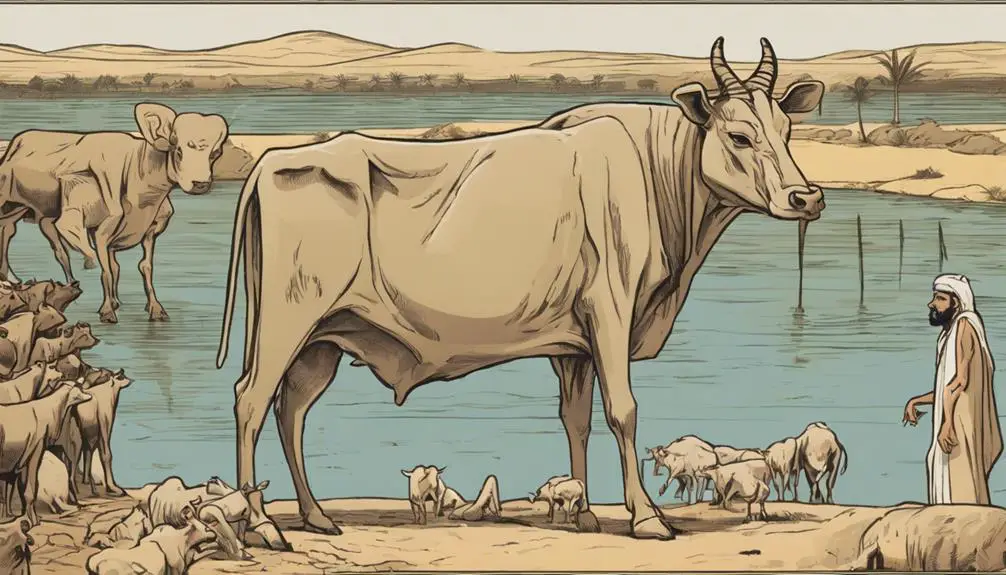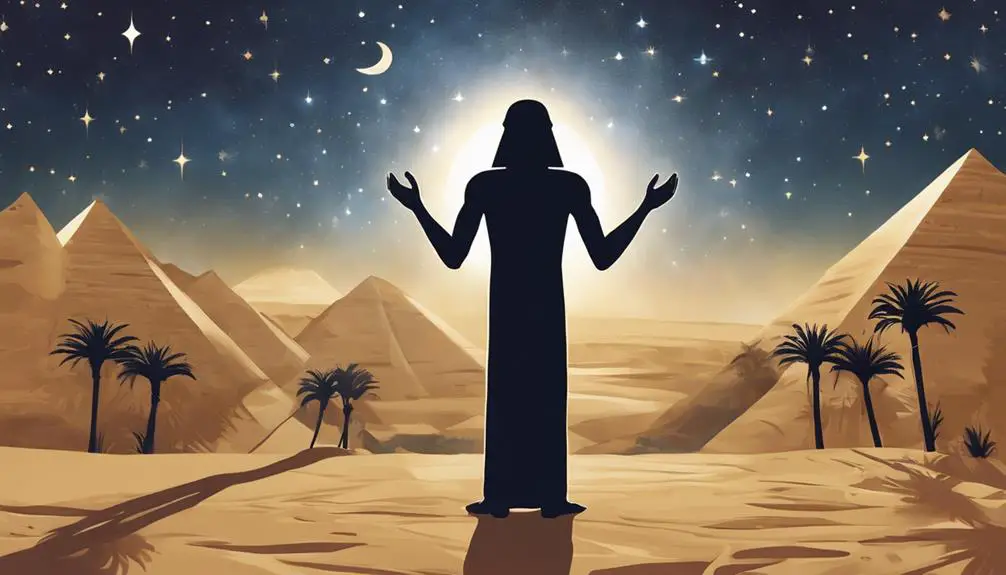Explore the profound meanings behind the 15 dreams in the Bible, and discover how these ancient visions can illuminate your spiritual journey.

15 Dreams in the Bible
As the saying goes, 'A dream is a wish your heart makes,' but in the Bible, dreams often serve as much more: divine messages, warnings, and prophecies.
You've likely heard of Joseph's ability to interpret dreams, but have you ever taken a closer look at all 15 dreams mentioned in the scriptures? From Jacob's Ladder to Pilate's wife's nightmare, each dream carries a heavy spiritual significance that has captivated believers and skeptics alike.
Exploring these dreams can offer you a deeper understanding of biblical narratives and the ancient world's view on dreams. Let's embark on a journey to uncover the mysteries and lessons embedded within these nocturnal visions, shall we?
Key Takeaways
- Dreams in the Bible often serve as mediums for divine communication and guidance.
- Many biblical dreams contain prophetic visions that foreshadow future events and societal changes.
- Interpretation of dreams can lead to wisdom, survival strategies, and the fulfillment of divine will.
- Dreams influence real-world actions and decisions, showcasing their significance in biblical narratives.
Jacob's Ladder Dream

Jacob's Ladder Dream, recounted in Genesis 28:10-19, serves as a pivotal moment in biblical narratives, symbolizing a profound connection between the divine and the earthly realms. You'll find that this dream, rich in angelic symbolism, isn't merely a fantastical story but a complex theological and psychological construct that beckons a deeper understanding of dream interpretation within a religious context.
In analyzing this dream, you're delving into the realm of angelic symbolism, where angels ascending and descending the ladder signify ongoing communication and intervention between God and humanity. This imagery prompts you to ponder the nature of divine messages and their conveyance through dreams, a common motif in biblical texts. It's not just about the presence of angels; it's about what they represent – a bridge between heaven and earth, embodying God's care and guidance.
Dream interpretation, especially in this context, isn't a straightforward task. You're encouraged to consider the broader implications of Jacob's vision. It's a narrative that underscores the covenant between God and Jacob's descendants, with the ladder symbolizing a pathway to understanding divine will. Through this lens, you're invited to appreciate the complexity and depth of biblical dreams, transcending mere stories to become profound expressions of faith and spirituality.
Joseph's Sheaves Dream
In Joseph's Sheaves Dream, recounted in Genesis 37:5-11, we observe a profound exploration of prophetic visions and their implications for familial dynamics and future destinies within biblical narratives. This dream not only signifies Joseph's ascendancy but also delves into the psychological tensions it stirs among his brothers.
Aspect |
Analysis |
|---|---|
Symbolism |
Sheaves representing people |
Foreshadowing |
Joseph's future dominance |
Reaction |
Envy and discord among brothers |
Interpretation |
Foretelling of power dynamics |
Psychological Impact |
Strain on familial relationships |
You'll find that dream interpretation in this context is not merely an act of decoding symbols but an intricate psychological analysis. The sheaves, bowing to Joseph's sheaf, are not just agricultural symbols but are deeply emblematic of human relationships and social hierarchies.
The dream's revelation leads to an exacerbation of the already strained relations between Joseph and his brothers, highlighting how dreams can serve as catalysts for real-world events and emotions. This dream, in particular, underscores the weight of divine messages and their profound impact on human psychology and societal structures, making it a pivotal moment in the biblical account.
Pharaoh's Dreams

Shifting our focus to another significant biblical narrative, we encounter Pharaoh's dreams, which similarly unveil deep prophetic insights and societal implications. In the story, Pharaoh is troubled by two dreams that none of his advisors can interpret, until Joseph is called upon. His accurate dream interpretation not only saves Egypt from a severe famine but also illustrates the pivotal role dreams play in divine communication and economic foresight.
Analyzing Pharaoh's dreams, we observe:
- The Immediate Need for Interpretation: Pharaoh's inability to comprehend his dreams underscores the importance of a mediator who can bridge the divine and the mundane, highlighting dream interpretation's critical role in ancient societies.
- The Economic Impact: Joseph's interpretation of the dreams predicting seven years of abundance followed by seven years of famine had a profound economic impact, leading to strategic grain storage that eventually saved Egypt and its neighbors.
- Prophetic Insight: The dreams serve as a divine warning, showcasing how foresight can lead to preparedness in the face of impending disaster.
- Societal Implications: The story emphasizes the societal reliance on visionary leaders capable of interpreting signs and making wise decisions to avert crisis.
In this narrative, dream interpretation directly influences economic planning and societal survival, emphasizing its significance in biblical times.
Solomon's Wisdom Dream
Another pivotal moment in the tapestry of biblical narratives is Solomon's wisdom dream, which marks a defining instance of divine guidance shaping leadership qualities. This dream isn't just a mere sleep-induced fantasy; it's a profound communication from the divine, acting as a wisdom source for Solomon. In this dream, God offers Solomon anything he wishes for. Solomon's choice of wisdom over wealth or power not only emphasizes the value of wisdom in leadership but also positions dream interpretation as a crucial skill in discerning divine messages.
Solomon's request highlights an understanding that true wisdom, the kind that can lead a nation justly, doesn't originate from human intellect alone but from a divine source. This account challenges you to see dreams as more than subconscious reflections; they can be mediums through which wisdom and guidance are imparted. The narrative underscores the role of dream interpretation in unlocking these messages, suggesting that understanding one's dreams can be a path to acquiring wisdom that's not readily accessible through conventional means.
Nebuchadnezzar's Statue Dream

Delving into the realm of prophetic dreams within the biblical narrative, Nebuchadnezzar's statue dream stands out as a vivid example of divine messages conveyed through dreams, demanding careful interpretation and understanding. This dream, rich in symbolism, is a cornerstone for dream interpretation and understanding ancient prophecies.
To help you grasp the significance of this dream, consider the following points:
- Symbolic Representation: The dream features a colossal statue composed of various materials, each representing different kingdoms. This imagery is a masterful use of symbolism to convey the rise and fall of empires.
- Divine Communication: Nebuchadnezzar's dream serves as a direct channel for divine messages, emphasizing the belief in divine providence and intervention in human affairs through dreams.
- Interpretive Skill: The dream highlights the importance of interpretive skill, placing Daniel in a position of prominence for his ability to decipher the dream's meaning, a testament to the value of wisdom and understanding in ancient texts.
- Prophetic Nature: The dream's depiction of successive kingdoms offers a glimpse into the prophetic vision of history, showcasing the predictive element of dreams in ancient prophecies.
This dream not only enriches the biblical narrative but also offers deep insights into the ancient understanding of dreams as mediums of divine message and prophecy.
Daniel's Four Beasts Vision
In the Book of Daniel, the vision of the Four Beasts stands as a pivotal moment, offering a complex symbol of divine judgement and the progression of earthly kingdoms through divine lens. You're delving into a narrative where beast symbolism and vision interpretation intertwine, revealing profound insights about power, dominion, and divine sovereignty.
The table below breaks down the vision for a clearer understanding:
Beast |
Symbolism |
|---|---|
Lion with eagle's wings |
Represents Babylon, symbolizing sovereignty and swiftness. |
Bear raised up on one side |
Embodies the Medo-Persian Empire, indicating power and imbalance. |
Leopard with four wings and four heads |
Symbolizes the Greek Empire, denoting speed, intellect, and expansion. |
Terrifying beast with iron teeth |
Represents the Roman Empire, highlighting destructiveness and strength. |
Ten horns on the fourth beast |
Signifies the division and subsequent rulers of the Roman Empire. |
This vision isn't just a dream; it's a divine communication, layered with meanings that you're encouraged to explore. Through beast symbolism, the vision opens a window to understanding how divine foresight casts a shadow over human history, asserting that despite the apparent autonomy of earthly kingdoms, they are under divine scrutiny and judgement.
Joseph's Warning Dream

Joseph's warning dream, recounted in the Book of Genesis, serves as a critical juncture where divine forewarning intersects with human destiny and governance. This narrative not only highlights Joseph's unique gift for dream interpretation but also underscores the profound significance of dream symbolism in ancient contexts.
- Divine Communication: Joseph's dream is a clear example of how dreams were perceived as a medium for divine messages. The vivid portrayal of forthcoming events emphasizes the belief in a transcendent guidance through dreams.
- Symbolism and Interpretation: Dream symbols, such as the fat and lean cows, represent years of abundance followed by famine. This showcases the importance of understanding and interpreting dream symbolism to uncover deeper meanings and warnings.
- Proactive Governance: The dream's interpretation led to strategic administrative actions, showcasing how divine warnings could influence governance. Joseph's foresight allowed Egypt to prepare for the impending famine, demonstrating the practical implications of dream interpretation.
- Human and Divine Interplay: This narrative illustrates the interplay between human agency and divine will. Joseph's ability to interpret dreams and act upon them showcases how divine guidance and human action can coalesce to avert disaster.
In essence, Joseph's warning dream is a pivotal moment that reveals the intricate relationship between dream interpretation, symbolism, and their profound impacts on history and governance.
Pharaoh's Baker and Cupbearer
The narrative of Pharaoh's baker and cupbearer further exemplifies the intricate role of dreams as divine messages within biblical texts, showcasing the complexities of interpretation and the profound consequences for those involved. You'll find that dream interpretation acts as a crucial juncture between divine will and human action, highlighting the precarious nature of interpreting and acting upon these celestial messages.
In this biblical account, both the baker and the cupbearer are imprisoned and experience dreams laden with symbolic imagery, desperately seeking their meanings. Joseph, who possesses the God-given ability to interpret dreams, becomes their beacon of hope. He predicts the cupbearer's restoration to Pharaoh's side and, conversely, the baker's grim fate.
Your observation of the baker's fate, as foretold by Joseph, underscores a pivotal theme: the divine endorsement of Joseph's interpretative skills and the demonstration of how dreams can serve as forewarnings. This narrative not only emphasizes the importance of correctly interpreting dreams but also illustrates the direct consequences of divine messages on individuals' lives. The accuracy of Joseph's interpretations confirms his unique connection with the divine, setting the stage for his rise to prominence.
Jacob's Wrestling Vision

As you delve deeper into the biblical narratives, Jacob's wrestling vision emerges as another pivotal moment where dreams and divine encounters intertwine, shedding light on personal transformation and the complexity of human-divine relationships. This story, rich in symbolism and theological depth, offers profound insights into the nature of divine wrestling and its impact on identity transformation. Here are key aspects to appreciate:
- Divine Encounter: Jacob's nighttime struggle isn't with a mere human but with a divine being. This encounter emphasizes the intensity and significance of divine wrestling in shaping one's destiny and relationship with God.
- Name Change: As a direct result of this wrestling, Jacob's name is changed to Israel, signifying his struggle with God and men and his prevailing. This marks a pivotal point in Jacob's life, highlighting the transformative power of divine encounters.
- Blessing: Despite the physical ailment Jacob sustains, he receives a blessing, underscoring the paradox that divine wrestling, while challenging, leads to spiritual growth and blessings.
- Identity Transformation: This event is emblematic of the transformative potential of engaging with the divine. Jacob emerges with a new identity, illustrating how divine encounters can profoundly alter one's sense of self and purpose.
Through Jacob's wrestling vision, we're offered a lens into the transformative potential of divine wrestling and the complexities of identity transformation.
Abimelech's Warning
ARTICLE TITLE: Dreams in the Bible
PREVIOUS SUBTOPIC: 'Jacob's Wrestling Vision'
CURRENT SUBTOPIC: 'Abimelech's Warning'
In a pivotal moment of divine communication, God warns Abimelech through a dream, preventing him from sinning against Abraham by taking Sarah as his wife, thus protecting the covenantal lineage. This narrative highlights the critical role dreams play in divine-human interaction within the biblical context. Dream interpretation becomes a means through which divine will is revealed, serving not only as a guide but also as a protective measure against transgression.
Aspect |
Analysis |
|---|---|
Divine Communication |
God's use of dreams as a direct channel to convey warnings and guidance. |
Protection of Covenant |
The dream serves to safeguard the lineage through which the covenant with Abraham would be fulfilled. |
Moral Implications |
Abimelech's response to the dream reflects the seriousness with which divine warnings are to be taken, emphasizing obedience and moral integrity. |
Dream Interpretation |
The clear, unambiguous message in Abimelech's dream underscores the importance of understanding and acting upon divine communication. |
Theological Context |
This event illustrates the broader theme of God's sovereignty and active involvement in human affairs through dreams and visions. |
Analyzing Abimelech's warning dream enriches our understanding of divine communication and dream interpretation within the biblical narrative.
Laban's Pursuit Dream

In a notable instance of divine intervention, God warned Laban in a dream not to harm Jacob, thereby influencing the course of biblical history by ensuring the safety and continuity of Jacob's journey. This event showcases the significant role dreams and their interpretation play in divine communication and human decision-making within the biblical narrative.
To better understand the depth of this incident, consider the following aspects:
- Divine Intervention: The dream serves as a direct intervention by God to protect Jacob, highlighting the divine interest and involvement in human affairs.
- Dream Interpretation: Laban's understanding and adherence to the warning in the dream underline the importance of dream interpretation in ancient times, serving as guidance for critical decisions.
- Historical Context: The dream occurs at a pivotal moment, as Laban pursues Jacob. It underscores the tension and potential for conflict, making the divine message crucial for peace.
- Theological Significance: This episode illustrates the broader theme of protection and guidance by the divine, reinforcing the notion that God's plans transcend human actions and conflicts.
Analyzing Laban's pursuit dream within these contexts enriches our comprehension of its significance in biblical history, offering insights into the complex interplay of divine intervention and human agency.
Pilate's Wife's Nightmare
Another noteworthy instance of divine messaging through dreams occurs when Pilate's wife experiences a nightmare, profoundly impacting the trial of Jesus Christ. This episode, captured in the Gospel according to Matthew, showcases the significant role that dreams play in divine communication within the biblical narrative. Pilate's wife, though not named, sends an urgent message to her husband, pleading for the innocence of Jesus based on her troubling dream. This intervention is pivotal, highlighting the weight of dream interpretation in ancient contexts.
Her nightmare, though not detailed, is understood as a divine warning, steering the course of events in a subtle yet powerful manner. This instance underscores the belief that dreams could serve as mediums for divine messages, intended to guide or warn individuals about forthcoming dangers or critical decisions. The urgency and gravity with which Pilate's wife's message is delivered to the Roman governor reflect the perceived authenticity and significance of divine communication through dreams.
Analyzing this event, it's clear that dream interpretation held a crucial place in understanding divine will, influencing decisions of monumental consequence. This narrative segment enriches the tapestry of biblical text, offering a window into the interplay between human agency and divine guidance through the enigmatic channel of dreams.
Gideon's Barley Bread Dream

Gideon's encounter with the barley bread dream, found within the Book of Judges, vividly illustrates the biblical motif of divine guidance communicated through dreams. This narrative segment intricately weaves together divine interpretation and human reaction, particularly focusing on Gideon's fearful reaction upon overhearing the interpretation of his dream by an enemy soldier.
- Contextual Framework: The dream features a loaf of barley bread tumbling into the Midianite camp, striking a tent with such force that it collapses. This seemingly mundane image is laden with prophetic significance, interpreted by the enemy as symbolizing Gideon's impending victory over Midian.
- Divine Interpretation: The immediacy with which the Midianite soldier interprets the dream underscores the divine orchestration behind dreams in the biblical tradition. This divine interpretation serves as a catalyst for Gideon's actions, bolstering his confidence in the face of overwhelming odds.
- Fearful Reaction: Initially, Gideon's reaction is one of fear and trepidation. The dream's interpretation reveals not just the outcome of the impending battle but also challenges Gideon's perceptions of strength and victory.
- Scholarly Perspective: Analyzing this dream from a scholarly viewpoint, it's evident that biblical narratives often utilize dreams as mediums for divine communication, embodying both guidance and reassurance. Gideon's dream, in particular, highlights how divine messages can transform fear into faith, steering individuals towards their destined path.
Samuel's Call
Samuel's call, a pivotal moment in biblical history, demonstrates the profound impact of divine communication through dreams and visions, directly shaping the course of Israel's leadership. This narrative, found in the books of Samuel, encapsulates the transition from the era of judges to the establishment of a prophetic ministry, anchored by divine calling. Samuel, asleep in the temple, hears his name called by God, not once but three times. Initially mistaking it for the voice of Eli, the high priest, it's a profound demonstration of the personal nature of divine calling.
This episode isn't just about the awakening of a boy to his prophetic duties but symbolizes the awakening of Israel to a new form of leadership and spiritual direction. Through Samuel's call, the text articulates the intimate, direct communication between the divine and individuals chosen for specific purposes. It underscores the selective nature of prophetic ministry, where such calls are both a privilege and a monumental responsibility.
Analyzing this, you see a clear pattern in the narrative: divine calling often comes in unexpected moments, demanding discernment and readiness to respond. Samuel's response, “Speak, for your servant is listening,” becomes a template for those who wish to engage in prophetic ministry, highlighting obedience, humility, and the readiness to serve as foundational virtues.
Ezekiel's Valley of Dry Bones

Building on the theme of divine communication in biblical narratives, Ezekiel's vision of the Valley of Dry Bones offers a starkly symbolic depiction of prophetic revelation and national restoration.
In this vision, you find a profound message of hope and spiritual revival, articulated through powerful prophetic symbolism. This narrative not only showcases the transformative power of God's word but also encapsulates a promise of rejuvenation for a nation that seemed irrevocably lost.
To fully appreciate the depth and implications of Ezekiel's vision, consider these aspects:
- Prophetic Context: The vision is set against the backdrop of Israel's Babylonian exile, serving as a metaphor for their current state of despair and disconnection from their homeland.
- Symbolic Representation: The dry bones symbolize the spiritual and political death of Israel, while their eventual reanimation represents divine promise of restoration.
- Divine Intervention: The role of God's spirit in reviving the dry bones underscores the theme of spiritual revival, highlighting the impossibility of restoration without divine intervention.
- Future Hope: The vision extends beyond immediate circumstances, offering a forward-looking perspective that promises national and spiritual renewal.
Through Ezekiel's vision, you're invited to explore the dynamics of despair, hope, and restoration, framed within a narrative rich in prophetic symbolism and divine assurance of spiritual revival.
Frequently Asked Questions
How Do Dreams in the Bible Reflect the Psychological States of Their Recipients?
When you explore dream symbolism through psychological analysis, you're diving into how subconscious feelings and thoughts manifest. Dreams often mirror your emotional state, fears, desires, and unresolved conflicts.
In the context of biblical dreams, they're not just mystical experiences but reflections of the psychological states of their recipients. They serve as a lens, offering insights into personal dilemmas, divine guidance, and the emotional landscapes that shape one's actions and beliefs.
Are There Any Instances Where Dreams in the Bible Have Led to Changes in Laws or Societal Norms?
You might wonder if dreams have ever sparked real-world change, shaping laws or societal norms.
When delving into dream interpretation and its societal impacts, it's fascinating to see historical instances where nocturnal visions led to profound shifts.
This analytical journey reveals that, indeed, dreams haven't just been personal experiences but catalysts for societal transformation, urging us to reconsider the profound influence of these nighttime revelations on our collective lives.
How Have Dreams in the Bible Been Interpreted Differently Across Various Cultures and Religions?
Dreams have been interpreted through various lenses of cultural symbolism and religious interpretations across different cultures and religions. You'll find that what's considered divine guidance in one tradition might be seen as forewarnings in another. This diversity in understanding stems from the deeply ingrained beliefs and values unique to each culture or religion.
As you delve into these interpretations, it's fascinating to see how they reflect broader societal norms and spiritual insights.
What Role Do Dreams Play in the Prophetic Messages of the Bible Compared to Direct Divine Interventions?
In exploring the tapestry of divine communication, you'll find dreams weave intricate patterns alongside direct interventions. Dreams serve as a mystical bridge, carrying prophetic messages with layers of dream symbolism that demand interpretation.
Unlike direct divine interventions, which offer clarity and immediacy, dreams' prophetic accuracy hinges on the beholder's insight. Analyzing these ethereal messages within a scholarly framework reveals their pivotal role in guiding, warning, or revealing divine will, painting a complex picture of spiritual narrative.
Can Dreams in the Bible Be Seen as a Form of Divine Therapy or Psychological Healing for the Dreamers?
You might consider dreams as therapeutic narratives, where dream symbolism plays a critical role in psychological healing. Analyzing these narratives, you'll notice they can serve as a form of divine therapy, offering insights and resolutions to the dreamers' inner conflicts or struggles.
This analytical approach reveals how dream symbolism isn't just a storytelling device but a profound tool for emotional and psychological healing, underscoring the depth and complexity of these experiences.
Conclusion
As you've journeyed through the nocturnal landscapes of the biblical narrative, you've witnessed dreams weaving the divine with the mortal, guiding destinies and nations. These dreams, like celestial tapestries, aren't merely figments but pivotal moments where the veil between the divine and human thins.
They serve as beacons, illuminating paths through the murky corridors of human existence and decision-making. In analyzing these dreams, you've not only traversed ancient texts but also plumbed the depths of the human psyche and its eternal quest for meaning and direction.



Sign up